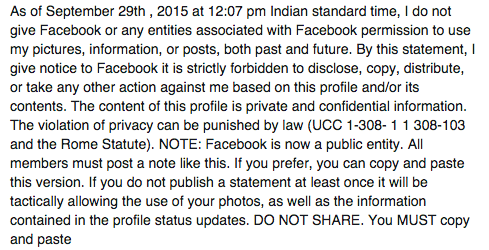That Viral Facebook Notice Is Still Meaningless – Why That’s Good for Users
By now you’ve probably seen an article or five taking down the viral Facebook “notice” appearing in people’s feeds, which purports to revoke rights from Facebook regarding one’s Facebook feed content and data (e.g., Jeff John Roberts here, or Caitlin Dewey here). This hoax reappears on Facebook with the regularity of some astronomical phenomenon, and is regularly debunked. But like a horror movie villain, it keeps coming back.
It is one thing to understand that this notice is ineffective. However, it is worth having a clear explanation why such unilateral proclamations aren’t enforceable for when this thing comes back again in six months dressed up with even more preposterous legal incantations citing the Rule Against Perpetuities.
More to the point, the fact that such a declaration is irrelevant actually turns out to be a pretty good thing for Internet users.
One version of the viral message is reproduced here.
Our use of online services, including social media like Facebook, is governed by the contract we accept when signing up. Sometimes this contract is called the terms and conditions (T&C), or terms of use (ToU), or the end-user license agreement (EULA). Facebook calls it the Statement of Rights and Responsibilities (there’s a link to it at the bottom of your Facebook page). Basically, an enforceable agreement.
When signing up for an account, a user is generally presented with the terms of this kind of an agreement and prompted to indicate they accept it, often by checking a box. (Woe unto the service that doesn’t actually do so!)
These contracts determine the terms of your deal with the service, and their terms with you. They tend to specify what you can and cannot do with the service. This is where services generally say they can boot you off if you violate certain rules, for example. It is also here that services like Facebook commit to providing the service under certain terms, and they too promise to do certain things and not do others. Both parties are bound by this kind of contract. Facebook cannot, without obtaining your agreement, suddenly start acting contrary to the deal it offered you when you signed up. Nor can you. And posting a “notice” online that you’re changing the deal, Darth Vader-style, while you continue using the service, simply isn’t enforceable as a matter of contract law.
This is a good thing for users, because the no-unilateral-changes rule is a two-way street. Online services can’t, for example, unilaterally decide they will change users’ agreements and start charging (if they swore that off), or divulge personal information (assuming they promised not to). At least, not unless users agree to it. If both parties agree to new terms, then there’s a new contract.
Typically these agreements also explicitly bind successors, meaning that your favorite social media platform generally cannot, after being acquired by another company, disavow all the promises made to you under the previous management. In this case, “sorry, your deal was with the last guys,” won’t cut it. Instead, a user might be presented with new terms after an acquisition. Basic contract law principles ensure that the user can walk away if they don’t like the terms of the new deal. (This is why the notice’s mention above of Facebook being a “public entity” — presumably a botched reference to Facebook’s 2012 public offering — is irrelevant.) Your deal with Facebook makes clear that it persists regardless of Facebook’s corporate ownership, until you and Facebook agree to a new deal. If users continue to use the service after being presented with new terms — even while saying “I don’t really like these terms” — courts are going to hold users to them, just as they will hold the service provider to the terms it has offered to the user, even if the service wanted to change those terms.
Consider the case noted several years ago by Prof. Eric Goldman, in which the e-commerce provider Zappos was involved in litigation where it had intended to update its Terms of Use, but never actually presented the new terms to users in a way that allowed them to realistically assent or opt out. Instead the new terms were buried on the website, with no notice to users. A court later refused to uphold these terms, saying
“…the advent of the Internet has not changed the basic requirements of a contract, and there is no agreement where there is no acceptance, no meeting of the minds, and no manifestation of assent.”
In an online environment where users strike deals with lots of service providers, users benefit from the fact that those deals cannot be changed without meaningful notice and a chance to walk away. The flip-side, however, is that users cannot unilaterally change their deal with Facebook through a mere status post that recites some sort of magical legal mantra. (Even if they invoke the 1998 Rome Statute of the International Criminal Court, which, in case you were wondering, pertains to war crimes and genocide and has absolutely no relevance here whatsoever.)









